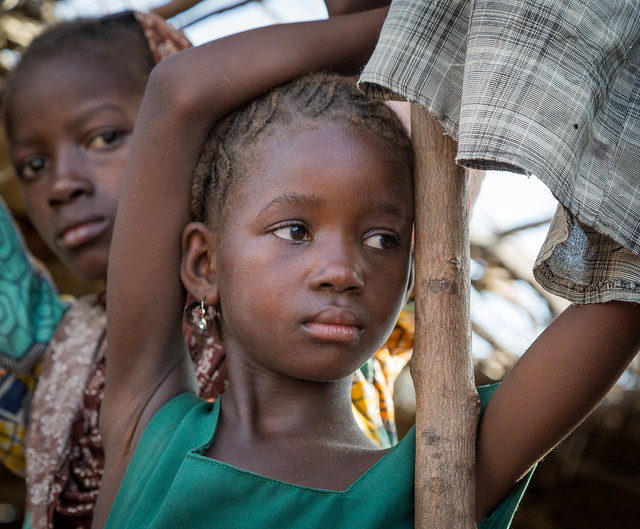The Food and Agricultural Organisation (FAO) of the United Nations has said that over four million Nigerians are currently hungry and suffer from malnutrition.

This, according to the FAO, country representative in Nigeria, Mr Fred Kateer, was largely due to conflicts, climate issues, pests and diseases, loss of biodiversity, habitat destruction and devastating effects of COVID-19 pandemic.

Mr Fred Kateero, who disclosed this in Abuja on Friday, October 15, 2021 during a press briefing to mark this year’s World Food Day celebration, said the aforementioned factors have worsened economic challenges in the country and propelled further unemployment rates.
To address these challenges, Kateero called on government to target interventions on research and development, largely to make farming more technologically advanced and imbibe innovations in digital agriculture.
He also called for rescaling of young people, and improvement of literacy rates, especially among women and the need to add essential elements such as better data governance and institutions.
Kareeto added that the FAO approaches to address hunger and malnutrition can only be effective if they are rooted in working together with the government, and other key partners to forge national pathways towards transformation.
“As we reflect on our actions today. Let us ensure that they are responsible actions that will guarantee in the future we want. We reap what we sow. we want a future where there’s better production, where it’s better nutrition, better environment, and a better life,” he said.
The Food and Agricultural Organisation (FAO) of the United Nations has said that over four million Nigerians are currently hungry and suffer from malnutrition.

This, according to the FAO, country representative in Nigeria, Mr Fred Kateer, was largely due to conflicts, climate issues, pests and diseases, loss of biodiversity, habitat destruction and devastating effects of COVID-19 pandemic.

Mr Fred Kateero, who disclosed this in Abuja on Friday, October 15, 2021 during a press briefing to mark this year’s World Food Day celebration, said the aforementioned factors have worsened economic challenges in the country and propelled further unemployment rates.
To address these challenges, Kateero called on government to target interventions on research and development, largely to make farming more technologically advanced and imbibe innovations in digital agriculture.
He also called for rescaling of young people, and improvement of literacy rates, especially among women and the need to add essential elements such as better data governance and institutions.
Kareeto added that the FAO approaches to address hunger and malnutrition can only be effective if they are rooted in working together with the government, and other key partners to forge national pathways towards transformation.
“As we reflect on our actions today. Let us ensure that they are responsible actions that will guarantee in the future we want. We reap what we sow. we want a future where there’s better production, where it’s better nutrition, better environment, and a better life,” he said.
The Food and Agricultural Organisation (FAO) of the United Nations has said that over four million Nigerians are currently hungry and suffer from malnutrition.

This, according to the FAO, country representative in Nigeria, Mr Fred Kateer, was largely due to conflicts, climate issues, pests and diseases, loss of biodiversity, habitat destruction and devastating effects of COVID-19 pandemic.

Mr Fred Kateero, who disclosed this in Abuja on Friday, October 15, 2021 during a press briefing to mark this year’s World Food Day celebration, said the aforementioned factors have worsened economic challenges in the country and propelled further unemployment rates.
To address these challenges, Kateero called on government to target interventions on research and development, largely to make farming more technologically advanced and imbibe innovations in digital agriculture.
He also called for rescaling of young people, and improvement of literacy rates, especially among women and the need to add essential elements such as better data governance and institutions.
Kareeto added that the FAO approaches to address hunger and malnutrition can only be effective if they are rooted in working together with the government, and other key partners to forge national pathways towards transformation.
“As we reflect on our actions today. Let us ensure that they are responsible actions that will guarantee in the future we want. We reap what we sow. we want a future where there’s better production, where it’s better nutrition, better environment, and a better life,” he said.
The Food and Agricultural Organisation (FAO) of the United Nations has said that over four million Nigerians are currently hungry and suffer from malnutrition.

This, according to the FAO, country representative in Nigeria, Mr Fred Kateer, was largely due to conflicts, climate issues, pests and diseases, loss of biodiversity, habitat destruction and devastating effects of COVID-19 pandemic.

Mr Fred Kateero, who disclosed this in Abuja on Friday, October 15, 2021 during a press briefing to mark this year’s World Food Day celebration, said the aforementioned factors have worsened economic challenges in the country and propelled further unemployment rates.
To address these challenges, Kateero called on government to target interventions on research and development, largely to make farming more technologically advanced and imbibe innovations in digital agriculture.
He also called for rescaling of young people, and improvement of literacy rates, especially among women and the need to add essential elements such as better data governance and institutions.
Kareeto added that the FAO approaches to address hunger and malnutrition can only be effective if they are rooted in working together with the government, and other key partners to forge national pathways towards transformation.
“As we reflect on our actions today. Let us ensure that they are responsible actions that will guarantee in the future we want. We reap what we sow. we want a future where there’s better production, where it’s better nutrition, better environment, and a better life,” he said.




















